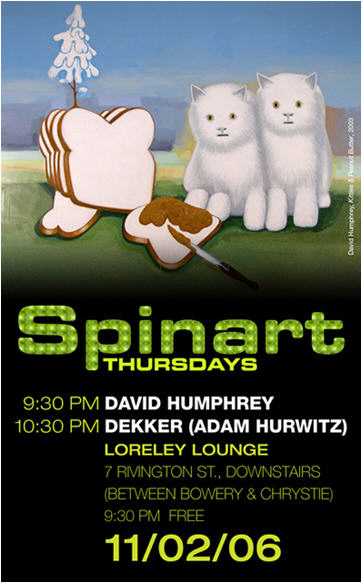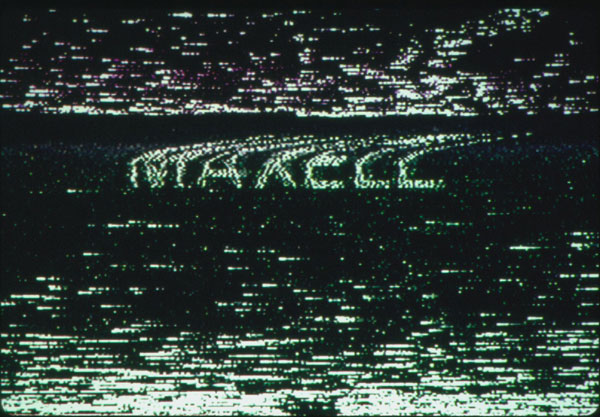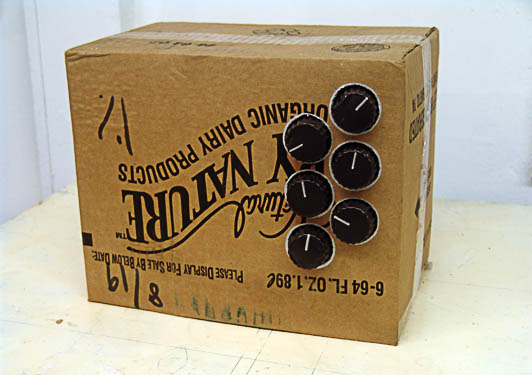View current page
...more recent posts
Joshua Johnson annotated:
[Cory] Arcangel's new show at Team Gallery, appropriately and ostentatiously [true that] titled "Subtractions, Modifications, Addenda, and Other Recent Contributions to Participatory Culture" samples various elements of popular culture and manipulates their presentation in order to effect an aporia of presentation. [An "aporia" is a rhetorical puzzle, but these are easily solved by a trip to the gallery desk--they will tell you exactly what the work means.]
While this sort of investigation is an old hat by now [true that], Arcangel has revived it by turning his attention to media whose substrata are so deeply integrated into the system of their presentation as to become almost invisible. Consumer culture is broadcast on increasingly complex instruments of distribution, while the very platforms that make their availability omnipresent have themselves multiplied in complexity. Recording instruments, encoding devices, and mixing instruments all require levels of technical ability and knowledge that cannot easily be mastered by the dilettante, in the same way that a Sunday painter could approximate the works of Vermeer. [You're kidding, right?] This difficulty is further compounded by the fact that often those who manipulate these devices are themselves unaware of the basic engineering features that allow them to function; I might upload a video to YouTube, but I know next to nothing about the Flash encoding technology that makes it possible. [Gosh, I thought the genius of YouTube was that you didn't have to know how it worked to use it.]
Untitled (After Lucier), 2006, confronts that specific issue head-on; Arcangel appropriates the strategy of avant-garde composer Alvin Lucier's 1970 piece I am Sitting in a Room, in which Lucier continued to re-record a recording of himself reading "I am sitting in a room..." until the recording became an abstract sonic portrait of the space he was recording in. Untitled (After Lucier) examines the implications of compression, by continuously digitally re-compressing a video of the Beatles' famous Ed Sullivan appearance. As the video compresses it becomes more and more abstract-- a visual representation of the process of compression. Essentially, Arcangel asks us to question how the experience of culture is transformed by the container it is presented in. When a video is uploaded to Youtube it is modified by the technology, and thus takes on the characteristics of the "room" in which the viewer experiences it. [Anyone who looks at YouTube notices the pixelation right off the bat. Also, just because Lucier says the piece is about the "room," you believe him? The end of the piece sounds like a vocoder (listen), very electronic and piercing--surely that is not the "room" but the amplified mechanical errors of recording "room tone." In other words, the point was made in the Lucier piece--Untitled (After Lucier) just brings it into the YouTube era to tell us something we already know about the bad effects of compression.]
related: Jonathan Horowitz / Baby We Were Born to Run (updated again)
Update: Just remembered that Arcangel had done an earlier piece (with RSG) on the theme of compression called TAC, or Total Asshole Compression. To quote coin-operated: "Drag and drop a file into TAC and it will make your file exponentially BIGGER than what it used to be." I dropped a 15k HTML file in there and it compressed (expanded) to 7.2 MB! The project emphasizes the fact that with hard drives and memory getting so cheap and expansive in space, that compression formats might not be needed in the future! Why not just expand instead of trying to make everything so small! Hasn’t the advent of broadband made us realize this yet? Anyways, TAC only runs on MAC OSX currently and I wouldn’t advise dropping a DIVX movie into the compressor or you might end up crashing your machine... wait a minute, I think I just discovered the point of this project." One supposes the sudden rise of YouTube made compression the other way relevant again, but either way the attitude is missed. Like Woody Allen, Arcangel's biggest problem is going to be competing with himself.
Now They Tell Us
From Columbia Journalism Review, reporters from CNN, NBC, New York Times, Cox Newspapers, et al, reminisce about the immediate aftermath of the US invasion in Iraq--how bad it really was when they were telling the American public how good it really was (thus helping to usher in four more years of Bush).
Geffen Sells Pollock to Pay Paul
"[In addition to selling a Pollock for $140 million, j]ust last month Mr. Geffen sold two other 20th-century paintings — a Jasper Johns and a Willem de Kooning — for a total of $143.5 million. Given that he is among many business figures who has expressed interest in buying The Los Angeles Times, media industry analysts speculated that he was trying to raise cash for a potential bid." [via]
So, a man who made his pile robbing musicians in one old tech milieu (pre-Napster CDs) sells his holdings by artists who make even older tech objects, unique (uncopyable) paintings, most of which value never accrues to the artists directly, to buy yet another old tech (dying) business (newsprint), premised on gatekeepers choking the flow of information.
What a guy!
Republican-tied Bechtel Corp. Doesn't Stay the Course; "Cuts and Runs" in Iraq
This is interesting:
The San Francisco Chronicle reports:When will Bush be questioning the company's patriotism?
Bechtel Corp. went to Iraq three years ago to help rebuild a nation torn by war. Since then, 52 of its people have been killed and much of its work sabotaged as Iraq dissolved into insurgency and sectarian violence.
Now Bechtel is leaving.
The San Francisco engineering company's last government contract to rebuild power, water and sewage plants across Iraq expired on Tuesday. Some employees remain to finish the paperwork, but essentially, the company's job is done.
 Tomorrow, Thursday, Nov. 2, after Olia Lialina's talk at Bryce Wolkowitz I'm heading over to the Lower East Side to hear David Humphrey and Adam Hurwitz do DJ sets at Spinart. This series has been featuring artists who also spin records; Humphrey is a great painter whose work is in the poster above. Adam sez: Please come out and join David Humphrey and myself for what will be the last in the Spinart Thursdays series at Loreley Lounge in the lower east side. David is a returning Spinart veteran and he will definitely be getting the party started right with his hip hop infused eclectic selection. I will take over with the ass shakin' beats that will bust your bass-bins!As in bratwurst, etc, not auto-fellatio. An excellent Hurwitz mix of dubby techno house can be downloaded at the blog A Brooklyn Life. I can't name individual tracks but I especially like the growly thing at 25:00, the weirdly pitch-shifted thing at 29:20, the the Rhodes thing at 38:50 and the Berlinoid electro trance thing at the very end. |

Jonathan Horowitz looms large in the "art as mediacrit" field. He currently shows with Gavin Brown gallery, and has been an influential force on the New York scene since the early '90s. Although he now uses the Internet as a tool and playing field, his work came to prominence during the VCR era. In his piece Maxell, a tape made in 1990 and projected on a large scale at Greene Naftali gallery in 1998, a black screen with the single word MAXELL has been dubbed and redubbed on a VCR so that it gets progressively grainier. But it isn't just degrading--random visual and audial noise is being picked up and amplified with each copy that begins to aggressively overwhelm the original source, in a way that is almost performative. When projected on a large screen, ugly violent electronic sounds and wrenching, spasmodic lightning zaps build dramatically, so that by the end of the tape the video becomes assaultive, almost scary in its sense of total abject breakdown. The piece shows the unintended consequences of mechanical reproduction, data transmission that is supposed to be seamless taken to its most extreme conclusion, so that it actually feels toxic. In other words, Art reveals a dark side to technology that has been there all along. The ultimate irony is the use of MAXELL as subject matter, a brand built on clarity and trust.
guthrie says on his del.icio.us page: "...youtube is totally reaching its golden peak (like napster did..), really gotta download all my favorites before they vanish....."
No kidding. They're vanishing as fast as copyrightholders decide they have had enough free (grainy) exposure. As far as saving them, the thing is, you won't, and I won't. File that under the best of intentions.
I have some Quicktime vids that I created up on this page--this marks me as a pre YouTubian dinosaur, yet most have been made since 2005.
I avoided YouTube because I dreaded that uniform rectangle and feared the Procrustean distortions that odd-sized formats would suffer. Also, I knew some evil f*ckw*d like Rupert Murdoch would end up with all my content on his server. Turns out it's google, but I don't have a gmail account, either.
I'm enjoying the YT ride, finding out what bands actually look like that I listened to a million times on vinyl and CD, and otherwise glomming onto bits of my cultural heritage, past and present. I'm filing them away in my mind because I don't trust that I'll find them again.
update: some ordinary vulgarities trimmed so the blog maintains its lofty tone

another lunchbox from Kristin Lucas' Happy and Sad Sack Lunch Series 2005...

...and an inhaler.
